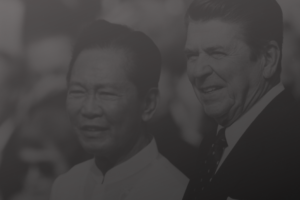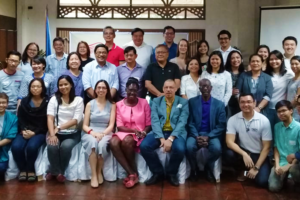[[{“type”:”media”,”view_mode”:”media_original”,”fid”:”1882″,”attributes”:{“alt”:””,”class”:”media-image”,”height”:”435″,”style”:”width: 600px; height: 272px;”,”typeof”:”foaf:Image”,”width”:”961″}}]]Photo credit: Ende Gelände licensed under CC BY-SA 3.0 license
IBON International Updates # 2
Climate Justice
November 10, Bonn – The 23rd Conference of Parties (COP 23) to the United Nations Framework Convention on Climate Change (UNFCCC) is happening from November 6-17, 2017 in Germany, with the Government of Fiji presiding. The 2-week talks aim to set the wheels of implementing the 2015 Paris Agreement (PA) on climate change into motion. It has been almost two years since 195 countries signed on to signify their commitment to take action on one of the biggest challenges facing the world today, climate change. The Paris Agreement is hailed as a landmark agreement that will chart the way to keep global temperature increase well below 2 degrees Celsius, and if possible, below 1.5 degrees C.
The COP 23 is expected to come out with decisions on a range of issues, including on (a) the ‘Paris Rulebook’ – the user manual that details the how of implementing the 2015 climate agreement; (b) a ‘Facilitative Dialogue’ to keep track of progress on countries’ making good on domestic actions they have pledged to do; (c) how much resources are forthcoming and who will foot the bill for lowering emissions and transitioning to low-carbon economies (mitigation) and helping those who have been facing the severest impacts of climate change (adaptation), and (d) how the global community responds to the fact that the impacts are getting more frequent and intense, and that damages permanent and go beyond the economic sphere (loss and damage).
Midway into the first week of the annual climate talks, intense debates particularly between developed and developing countries have emerged, and is expected to heighten in the coming days. While calling on world leaders to "do everything we can to make the PA work and to advance ambition and support for climate action before 2020,” Fijian Prime Minister Frank Bainimarama also deferred negotiations on measuring how developed countries have delivered on their commitments to reduce emissions and in providing developing countries with resources to cope with the impacts of climate change and move towards greener technologies.
Developing countries are insisting to put the matter of ‘pre-2020 actions’ into the formal negotiations, which developed countries do not approve of. The Paris Agreement only comes into effect in 2020, and so developing countries are demanding that a discussion be held on existing commitments to address climate change before 2020. They argued that even the second commitment period of Kyoto Protocol that obliges developed countries to further reduce emissions had not been ratified to date. The European Union, US, Canada, Japan, Norway and Australia staunchly opposed this proposal, citing procedural arguments including the supposed lack of time to cover all agenda items.
The task ahead at COP 23 is technically complex and politically charged, and will surely affect the outcomes of this exercise in climate diplomacy. A few days ago, Nicaragua and Syria signed on to the Paris Agreement, which then leaves only the United States as the odd country likely out of the global agreement.
People’s Climate Summit, Klima Demo and Ende Gelände
Days before the official climate negotiations started, there were also a number of activities that brought together representatives of civil society organizations and social movements from around the world to deliver a more critical and urgent message. German civil society organized a People’s Climate Summit where discussions were held not only on the impacts of climate change, but on strategies for building stronger movements to push for systemic change, as the climate crisis can only be resolved with the profound transformation of economic, social and political systems.
[[{“type”:”media”,”view_mode”:”media_original”,”fid”:”1881″,”attributes”:{“alt”:””,”class”:”media-image”,”height”:”970″,”style”:”width: 600px; height: 284px;”,”typeof”:”foaf:Image”,”width”:”2048″}}]]
Photo: A workshop on climate, militarism and wars, organised by IBON International with Rosa Luxemburg Stiftung. Photo credit: WECF International
On November 4th, 25,000 people massed up in the largest demonstration for climate in Germany to call upon governments to take action to phase out coal and dirty energies. The German government was particularly called out as it portrays itself as a ‘climate champion’ while being the world’s largest producer of lignite (also known as ‘brown coal’). The following day, more than four thousand people participated in a civil disobedience action in the Rhineland coal mining area, Europe’s largest CO2 emitter to stress the point that coal and other dirty energies come in the way of climate justice – and so they say Ende Gelände (here and no further!).
###




